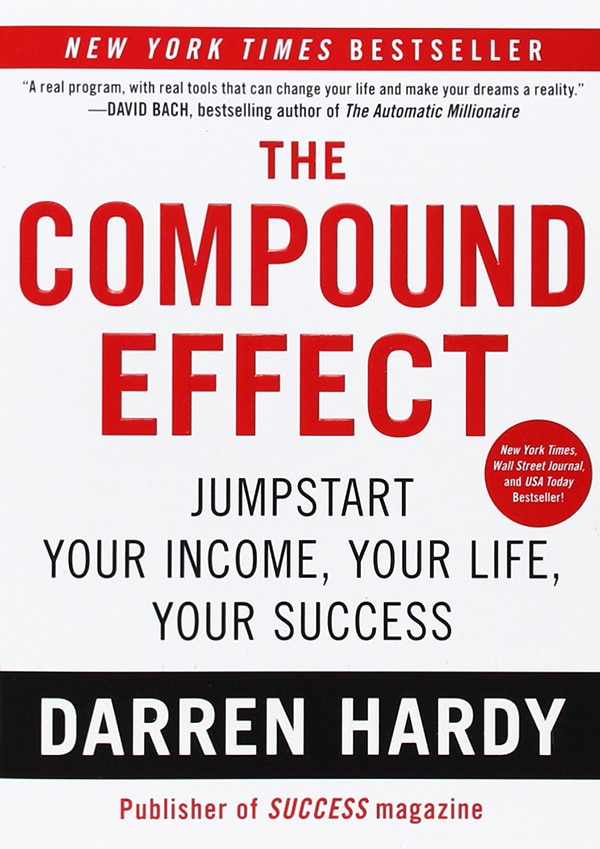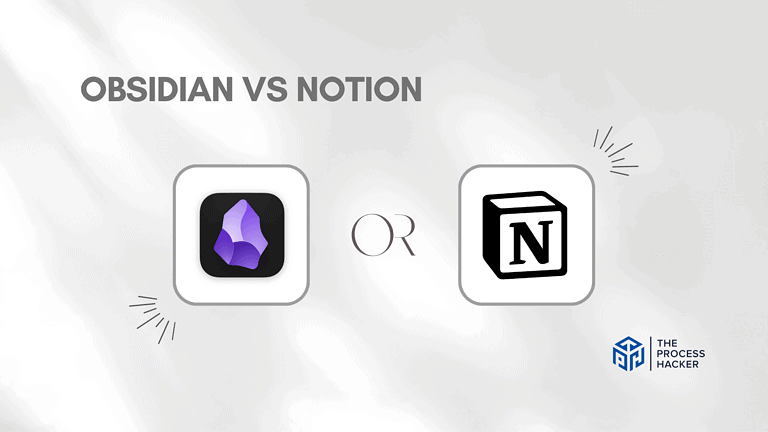The Compound Effect by Darren Hardy | Summary
In his book, Darren Hardy shows you how to harness the Compound Effect to create the success and the extraordinary life you want.
Are you eager to achieve success in your career or business, but feeling overwhelmed by the quantity of advice about how to do it? Look no further than The Compound Effect by Darren Hardy for a powerful and straightforward set of principles that can help you make real progress!
In his book, The Compound Effect: Jumpstart Your Income, Your Life, Your Success, Darren Hardy shows you how to harness the power of The Compound Effect to create the success and the extraordinary life you want.
The Compound Effect is the strategy of being consistent with smart, tiny choices over time that will produce significant results. This simple, fundamental principle will help you multiply your success, track your progress, and accomplish your goals. To fuel your journey, consider reading insights from other habit-building books like “Atomic Habits” by James Clear or “The Power of Habit” by Charles Duhigg – they’ll provide the roadmaps to making those small, smart choices a lasting part of your routine.
Buy The Compound Effect on Amazon

The Compound Effect by Darren Hardy
Jumpstart Your Income, Your Life, and Your Success
Read The Compound Effect summary, as it’s sure to have a positive effect on your personal and professional life. For more than this book summary, Hardy provides additional resources at The Compound Effect website.
Download the PDF Book Summary for The Compound Effect
Chapter 1 – The Compound Effect in Action
Many struggle to achieve success, because people seek instant gratification and cannot sustain their results. With enough time, Darren Hardy knows he can beat anyone despite not being the best, smartest, or fastest.
It is due to harnessing the power of the Compound Effect to create good habits that he constantly applies to be successful in any arena:
The Compound Effect – the principle of reaping huge rewards from consistently taking small, seemingly insignificant actions over a long period of time
At the moment, the smarter choices feel insignificant but will help you improve your health, wealth, and relationships over the long term. Darren Harry captures the Compound Effect in this formula:
Small, Smart Choices + Consistency + Time = Radical Difference
“The most challenging aspect of the Compound Effect is that we have to keep working away for a while, consistently and efficiently, before we can begin to see the payoff.”
“Your only path to success is through a continuum of mundane, unsexy, unexciting, and sometimes difficult daily disciplines compounded over time.”
Chapter 2 – Choices
In this chapter of the Compound Effect, Hardy helps you gain awareness and make positive choices based on your goals and values. Recognize that the results in your life stem from choices you made earlier. Each choice initiates a behavior that, over time, evolves into a habit. Choosing poorly or not choosing can force you to make tougher decisions later.
Taking Responsibility And Getting Lucky
Many common, minute, and trivial choices can be destructive. We make choices unconsciously, so it is difficult to consciously change our negative behaviors into positive habits. Check out Atomic Habits (book summary) for more on building good habits.
Thus, you need to take extreme ownership for every action, lack of action, and reaction. Keeping that in mind, you will get “lucky” through the following formula:
The (Complete) Formula for Getting Lucky: Luck is a result of the following components:
- Preparation – the practice and improvement of your skills, knowledge, expertise, relationships, and resources, allowing you to take advantage of great opportunities
- Attitude – your belief or mindset of reframing all situations, conversations, and circumstances as positive and fortuitous
- Opportunity – the natural occurrence of the luck that you create that comes quickly and unexpectedly
- Action – what you are doing about the opportunities that come your way
From now on, you must be the master of your life by taking control and completely owning your life. Many others before you have succeeded in the face of great weaknesses and obstacles. Thus, you should not complain or make excuses about unfortunate circumstances in your life.
Your Scorecard: Your Secret Weapon
You need to measure something to manage or improve it. To take control of your choices, you should track your behavior and gain awareness of your choices through the following steps:
- Choose an area of your life where you want to succeed the most: “I am going to start tracking _______________ on [date/month/year].”
- Track every action in this one area for the next three weeks using a notebook or phone. Three weeks is a great benchmark regarding habit formation.
- Write every observation and behavior down every day, no matter what.
Tracking allows you to gain moment-to-moment awareness regarding the small things you are doing right and wrong. In the beginning, act immediately and focus on one habit that you believe will move you toward your goals. Then, once you start benefiting from the Compound Effect, expand tracking to other areas in your life.
Download the PDF Book Summary for The Compound Effect
Chapter 3 – Habits
In this chapter of the Compound Effect, Darren Hardy helps put your motivating choices to work with positive behaviors that, repeated over time, build good habits. Aristotle wrote, “We are what we repeatedly do.” Merriam-Webster defines a habit as follows:
Habit – “an acquired mode of behavior that has become nearly or completely involuntary”
We are habitual beings, as research shows that “95 percent of everything we feel, think, do, and achieve is a result of a learned habit.” We are born with instincts, but with enough repetition, good or bad behaviors become automated unconsciously in our habits. The most successful people consciously form positive habits to their benefit to be more knowledgeable, capable, and prepared.
Avoid Instant Gratification
The primary issue with bad habits is providing instant gratification that typically outweighs your ability to reason with the negative long-term consequences. Instead, become aware of the negative habits that compound into significant problems. Breaking bad habits is difficult, and willpower is not enough.
Find Your Why-Power
Instead, use why-power to connect your actions and goals to your purpose, values, and dreams. In Start With Why, Simon Sinek, your why will provide the meaning and motivation or emotional rocket fuel to take significant action in your life and work.
“When the reason is big enough, you will be willing to perform almost any how.” Your why needs to be meaningful internally beyond any external financial, social, and material goals. The access point to your why-power is through your core values:
Core Values – define both who you are and what you stand for
Your core values can help you filter all of life’s demands, requests, and temptations, making sure they’re leading you toward your intended destination. Defining your core values also helps make decision-making simpler and more efficient. When faced with a choice, ask yourself, “Does this align with my core values?” If it does, do it. If not, don’t, and don’t look back.
People can be fueled by hate and anger just as much as love and happiness. Sometimes, an enemy, negative emotion, or bad experience can motivate you to succeed. Enemies and bad moments can give us the reason to confront adversity with courage.
Goals
Paul J. Meyer, a mentor of Darren Harden, has said, “If you are not making the progress that you would like to make and are capable of making, it is simply because your goals are not clearly defined.” The most successful people establish a clear, compelling vision for why before determining how. After, they define and write down their goals to work toward the vision.
Goals are essential, and if you want to have a full life, you must master how to set and achieve goals effectively. First, consider all aspects of your life for setting SMART goals: career, finances, health, relationships, etc. Then, you should ask, “Who do I need to become?” Jim Rohn has said, “If you want to have more, you have to become more. Success is not something you pursue. … Success is something you attract by the person you become.”
Achieving goals requires the following formula:
You → Choice (decision) + Behavior (Action) + Habit (repeated action) + Compounded (time) = Goals
Breaking Bad Habits
These are five strategies to eliminate bad habits:
- Identify Your Triggers: With your list of these habits, identify the who, what, where, and when of the triggers.
- Clean House: Remove everything in your environment that enables these habits, even if your family thinks it is unfair.
- Swap It: Attempt to replace, delete, or swap these worst habits with less harmful or healthier alternatives.
- Ease In: Take smaller steps into unraveling your deep-rooted habits over time.
- Or Jump In: Or really commit and change many of these habits at once to transform your lifestyle.
Run a Vice Check: Every three months, pick a vice and abstain from it for thirty days to prove to yourself that you are still in charge of the bad habit. If you find it tough to abstain for the month, it may be a bad habit that you should remove from your life.
Building Good Habits
These are six techniques for building good new habits:
- Set Yourself Up to Succeed: Create a positive environment and lifestyle that allows your new behaviors to thrive.
- Think Addition, Not Subtraction: Choose positive actions to “add-in” to enrich and replace your negative actions.
- Go for a Public Display of Accountability (PDA): Inform your friends, family, and coworkers about your habits to be held accountable.
- Find a Success Buddy: Seek out an accountability partner to motivate each other and work on your habits together.
- Competition and Camaraderie: Organize a contest tracking a particular habit amongst friends, family, or work colleagues.
- Celebrate: When you complete your habits for a week, month, or quarter, you should enjoy the victory and reward yourself.
Building good habits and breaking bad habits requires patience. Research shows that it requires attention and consistency over time to form neural pathways to engrain the new positive habit. Habits do not form overnight, and setbacks do occur, so just keep trying. For more on habits, check out the books, Atomic Habits (book summary) or The Power of Habit (book summary).
Chapter 4 – Momentum
In this chapter of The Compound Effect, Hardy helps gain momentum and break away from the combined average person. Everything you have learned in the first three chapters gets multiplied with the momentum. Let’s begin with Newton’s First Law:
Newton’s First Law (Law of Inertia): “Objects at rest tend to stay at rest unless acted on by an outside force. Objects in motion tend to stay in motion unless something stops their momentum.”
It can be tough to gain momentum and adapt to change. You must take small actions with slow progress. Eventually, your newly formed habits become established, momentum builds, and your results compound. When you get momentum, it will be difficult to stop, which is indicative of why some people are really successful.
Routines
To capture the momentum well, you can create a system in the form of a routine:
Routine – “something you do every day without fail”
You should incorporate your new mindset and habits into a monthly, weekly, or daily routine to have powerful, everlasting change. Routines can encapsulate healthy behaviors in a sequence that is automatic and efficient. Routines that are predictable and followed will allow you to achieve the most significant goals.
To create an effective routine, you must determine what healthy behaviors and habits to implement. For example, the most successful people bookend their days with morning and evening routines that support their performance.
Morning Routine: Rise & Shine
In the Compound Effect, Hardy shares his morning routine, which grounds him in essential habits and prepares him for the day:
- Wakes up at 5:00/5:30 AM and hits snooze to have 8 minutes for:
- Expresses gratitude for what he has and tunes his mind to think abundantly;
- Send love to someone in his life and wish them the best; and
- Visualize his most important goal and decides on three daily actions to work on it.
- Gets out of bed and makes coffee.
- Stretches for about 10 minutes.
- Reads something positive and instructional for about 30 minutes.
- Eats that frog or works on the most important project with deep work and no distractions for an hour.
- Calibrates his day for 15 minutes.
- Reads his five-year, annual, quarterly, monthly, and weekly goals.
- Reviews his top three Most Valuable Priorities (MVPs) for the day.
- Asks If I only did three things today, what are the actions that will produce the greatest results in moving me closer to my big goals?
- Opens email only to assign and delegate tasks.
- Gets back to work on MVPs.
Evening Routine: Sweet Dreams
Also, Darren Hardy shares his evening routine, which wraps the day and prepares him for sleep:
- “Cashes out” of daily performance by asking:
- Referencing the daily plan, what tasks got accomplished?
- What other tasks need to be added based on what happened during the day?
- What tasks are not necessary anymore?
- Logs new ideas, epiphanies, or insights into his journal.
- Reads about ten pages of an inspirational book before bed.
If you keep taking the same action, you will eventually get bored and plateau. Thus, you need to change it up and challenge yourself to maintain momentum. For example, you can try new activities or hobbies or change your routines to generate different results.
Rhythms
After creating a routine with your daily behaviors and habits, you want it to occur in a rhythm:
Rhythm – a strong, regular repeated pattern of movement or sound
This rhythm can only be achieved through planning, which then generates momentum. Then, you can have your disciplines work together in harmony on a weekly, monthly, quarterly, and annual basis. Once scheduled, you don’t have to think and simply execute your plan. You can track your rhythm with the Rhythm Register:
Rhythm Register – tracks your daily habits to help you make progress toward your goals; download a copy here
When starting a new habit, we tend to overdo our actions in the short term due to excitement or wanting to succeed. As a result, we tend to think of rhythms in the next week, month, or quarter. Instead, we should think of success for the long term and set up a sustainable rhythm. The Compound Effect is the positive results you want to experience in your life—will be the result of smart choices (and actions) repeated consistently over time.”
The Power Of Consistency
Consistency is crucial for success. Momentum is lost quickly due to inconsistency, as it requires time and energy to repeated start and stop. You may fall short of your goals due to running out of personal resources. Maintaining consistency will allow you to progress toward your goals.
Download the PDF Book Summary for The Compound Effect
Chapter 5 – Influences
In this chapter of the Compound Effect, Darren Hardy “discusses the many influences that (mostly unknowingly) can help or hinder your ability to succeed.” Although these influences are prevalent and influential, you should manage them to your advantage.
I. Input: Garbage In, Garbage Out
If you want to perform at a peak level, you need to consume high-quality nutrients and information for your body and mind, respectively. However, it is much harder to protect your mind from terrible information, so ask yourself:
- “What are you thinking about?”
- “What is influencing and directing your thoughts?”
The answer is “whatever you’re allowing yourself to hear and see.” Your mind is like an empty glass that the world will inevitably fill it with dirty water:
- Dirty Water – the negative, unproductive, and unnecessary information that consists of sensational news, mind-numbing sitcoms, dramatic politics, etc.
Instead, you should be conscious of what you intake and flush it out with clear water:
- Clear Water – the positive, inspirational, and supportive information that consists of personal development, skill development, stories of inspirational people, etc.
Here are two methods to flush using clear water:
- Stand Guard: The media can take your mind hostage and hinder your creativity, productivity, and focus. Therefore, put yourself on a media diet by avoiding the news and filtering the information that will help you in your personal and professional life.
- Enroll in a Drive-Time U: Your car is a great place to learn while you drive. You can “gain knowledge equivalent to two semesters of an advanced college degree—every year.” Thus, you should download your phone with informational audiobooks and podcasts.
II. Associations: Who’s Influencing You?
Research shows that the people that you regularly associate with correlate to about 95 percent of whether you will succeed or fail in life. First, you should avoid or limit the following associations:
- Dissociations – these people are negative, bring you down, and refuse to grow, so you should completely break from them in your life
- Limited Associations – these people require a time limit, so determine how much time you can “afford” to be influenced by them
Instead, you should surround yourself with people who represent and positively influence the life you want. This third group is those with who you should expand your association:
Expanded Associations – these people “have positive qualities in the areas of life where you want to improve;” and improve your relationships by asking yourself:
- “Who has the type of relationship I want?
- How can I spend (more) time with that person?
- Who can I meet who can positively influence me?”
There are three specific expanded associations that you should seek:
- Peak-Performance Partner – “someone as equally committed to study and personal growth as you” that you trust and gives brutally honest feedback; ask each other:
- “How do I show up to you?
- What do you think my strengths are?
- In what areas do you think I can improve?
- Where do you think I sabotage myself?
- What’s one thing I can stop doing that would benefit me the most?
- What’s the one thing I should start doing?”
- Mentorship – a relationship in which the individual with more experience, knowledge, and connections teaches and guides a more junior person; one should be willing to teach and be taught
- Personal Board of Advisors – your advisory group of “people who have achieved the success you want to create in your own life” to reach out to “solicit ideas, run thoughts by them, and ask for feedback and input
III. Environment: Changing Your View Changes Your Perspective
To be successful, your environment should be positive and work to support your growth and goals. Further, you should declutter your environment of both physical and mental clutter so you can be productive. When shaping your environment and every area of your life, “you will get in life what you accept and expect you are worthy of.”
Chapter 6 – Acceleration
In this chapter of the Compound Effect, Darren Hardy shows you how to take everyone you have learned and accelerate your result. Also, you will face moments of truth and can use the Compound Effect to break through to achieve greater success.
Multiplying Your Results
Real personal growth occurs from how you overcome obstacles or expectations by:
- Overcoming Obstacles Well: Identify as being the toughest competitor and “go above and beyond” when you encounter challenges or hit the wall.
- Beating the Expectation: When you do “enough” or reach an expected level of accomplishment, raise your standards and exceed what is expected.
- Doing the Unexpected: Determine what is popular or average and take different, more powerful actions as “common things deliver common results.”
In your own life, look for extraordinary opportunities to do better and multiply your results. Rise to the occasion to “go a little further, push yourself a little harder, last a little longer, prepare a little better, and deliver a little bit more.”
Download the PDF Book Summary for The Compound Effect
Conclusion and Next Steps
“Learning without execution is useless. Motivation without action leads to self-delusion.” In his book, Darren Hardy presents “The Compound Effect as a tool that, when combined with consistent, positive action, will make a real and lasting difference in your life.”
Darren Hardy poses these simple questions from pondering about your life five years ago:
- “Are you now where you’d thought you’d be five years later?”
- Have you built great habits and developed the skills you wanted?
- Have you broken the bad habits that you committed to getting rid of?
- Are you in the physical health and shape you desired to be in?
- Do you have many loving relationships and an excellent partner?
- Are you living your ideal lifestyle and reaping huge rewards of income and freedom?
If not, you should ask why? Darren Hardy says that it starts with a simple choice to change your life and incorporate what you have learned. For more help beyond The Compound Effect summary, check out the additional resources at the book’s website or get your own copy of the book here:







